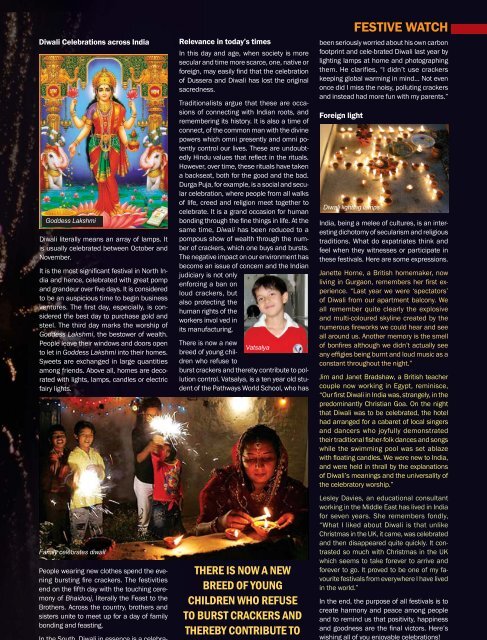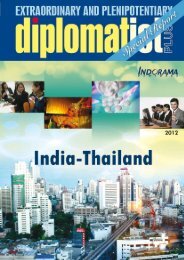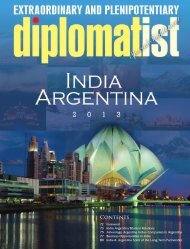to view Expat - LB Associates
to view Expat - LB Associates
to view Expat - LB Associates
You also want an ePaper? Increase the reach of your titles
YUMPU automatically turns print PDFs into web optimized ePapers that Google loves.
Diwali Celebrations across India<br />
Goddess Lakshmi<br />
Diwali literally means an array of lamps. It<br />
is usually celebrated between Oc<strong>to</strong>ber and<br />
November.<br />
It is the most signifi cant festival in North India<br />
and hence, celebrated with great pomp<br />
and grandeur over fi ve days. It is considered<br />
<strong>to</strong> be an auspicious time <strong>to</strong> begin business<br />
ventures. The fi rst day, especially, is considered<br />
the best day <strong>to</strong> purchase gold and<br />
steel. The third day marks the worship of<br />
Goddess Lakshmi, the bes<strong>to</strong>wer of wealth.<br />
People leave their windows and doors open<br />
<strong>to</strong> let in Goddess Lakshmi in<strong>to</strong> their homes.<br />
Sweets are exchanged in large quantities<br />
among friends. Above all, homes are decorated<br />
with lights, lamps, candles or electric<br />
fairy lights.<br />
Family celebrates diwali<br />
People wearing new clothes spend the evening<br />
bursting fi re crackers. The festivities<br />
end on the fi fth day with the <strong>to</strong>uching ceremony<br />
of Bhaidooj, literally the Feast <strong>to</strong> the<br />
Brothers. Across the country, brothers and<br />
sisters unite <strong>to</strong> meet up for a day of family<br />
bonding and feasting.<br />
Relevance in <strong>to</strong>day’s times<br />
In this day and age, when society is more<br />
secular and time more scarce, one, native or<br />
foreign, may easily fi nd that the celebration<br />
of Dussera and Diwali has lost the original<br />
sacredness.<br />
Traditionalists argue that these are occasions<br />
of connecting with Indian roots, and<br />
remembering its his<strong>to</strong>ry. It is also a time of<br />
connect, of the common man with the divine<br />
powers which omni presently and omni potently<br />
control our lives. These are undoubtedly<br />
Hindu values that refl ect in the rituals.<br />
However, over time, these rituals have taken<br />
a backseat, both for the good and the bad.<br />
Durga Puja, for example, is a social and secular<br />
celebration, where people from all walks<br />
of life, creed and religion meet <strong>to</strong>gether <strong>to</strong><br />
celebrate. It is a grand occasion for human<br />
bonding through the fi ne things in life. At the<br />
same time, Diwali has been reduced <strong>to</strong> a<br />
pompous show of wealth through the number<br />
of crackers, which one buys and bursts.<br />
The negative impact on our environment has<br />
become an issue of concern and the Indian<br />
judiciary is not only<br />
enforcing a ban on<br />
loud crackers, but<br />
also protecting the<br />
human rights of the<br />
workers invol ved in<br />
its manufacturing.<br />
There is now a new<br />
Vatsalya<br />
breed of young children<br />
who refuse <strong>to</strong><br />
burst crackers and thereby contribute <strong>to</strong> pollution<br />
control. Vatsalya, is a ten year old student<br />
of the Pathways World School, who has<br />
THERE IS NOW A NEW<br />
BREED OF YOUNG<br />
CHILDREN WHO REFUSE<br />
TO BURST CRACKERS AND<br />
THEREBY CONTRIBUTE TO<br />
FESTIVE WATCH<br />
been seriously worried about his own carbon<br />
footprint and cele-brated Diwali last year by<br />
lighting lamps at home and pho<strong>to</strong>graphing<br />
them. He clarifies, “I didn’t use crackers<br />
keeping global warming in mind… Not even<br />
once did I miss the noisy, polluting crackers<br />
and instead had more fun with my parents.”<br />
Foreign light<br />
Diwali lighting lamps<br />
India, being a melee of cultures, is an interesting<br />
dicho<strong>to</strong>my of secularism and religious<br />
traditions. What do expatriates think and<br />
feel when they witnesses or participate in<br />
these festivals. Here are some expressions.<br />
Janette Horne, a British homemaker, now<br />
living in Gurgaon, remembers her fi rst experience.<br />
“Last year we were ‘specta<strong>to</strong>rs’<br />
of Diwali from our apartment balcony. We<br />
all remember quite clearly the explosive<br />
and multi-coloured skyline created by the<br />
numerous fi reworks we could hear and see<br />
all around us. Another memory is the smell<br />
of bonfi res although we didn’t actually see<br />
any effi gies being burnt and loud music as a<br />
constant throughout the night.”<br />
Jim and Janet Bradshaw, a British teacher<br />
couple now working in Egypt, reminisce,<br />
“Our fi rst Diwali in India was, strangely, in the<br />
predominantly Christian Goa. On the night<br />
that Diwali was <strong>to</strong> be celebrated, the hotel<br />
had arranged for a cabaret of local singers<br />
and dancers who joyfully demonstrated<br />
their traditional fi sher-folk dances and songs<br />
while the swimming pool was set ablaze<br />
with fl oating candles. We were new <strong>to</strong> India,<br />
and were held in thrall by the explanations<br />
of Diwali’s meanings and the universality of<br />
the celebra<strong>to</strong>ry worship.”<br />
Lesley Davies, an educational consultant<br />
working in the Middle East has lived in India<br />
for seven years. She remembers fondly,<br />
“What I liked about Diwali is that unlike<br />
Christmas in the UK, it came, was celebrated<br />
and then disappeared quite quickly. It contrasted<br />
so much with Christmas in the UK<br />
which seems <strong>to</strong> take forever <strong>to</strong> arrive and<br />
forever <strong>to</strong> go. It proved <strong>to</strong> be one of my favourite<br />
festivals from everywhere I have lived<br />
in the world.”<br />
In the end, the purpose of all festivals is <strong>to</strong><br />
create harmony and peace among people<br />
and <strong>to</strong> remind us that positivity, happiness<br />
and goodness are the fi nal vic<strong>to</strong>rs. Here’s<br />
wishing all of you enjoyable celebrations!






